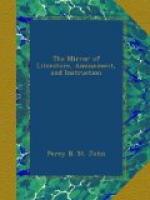Such was the origin of the Royal Exchange. After its destruction, in 1666, the funds in the hands of Sir Thomas Gresham’s trustees amounted to no more than L234. 8s. 2d.; but, with a spirit beyond all praise, they contributed from their own resources the necessary sum for rebuilding the Exchange, which was completed and opened September 28, 1669, the total cost being L58,962, which the City Corporation and the Mercers’ Company defrayed equally between them. Since that period it has undergone several reparations; but a most complete and substantial one was commenced in 1820, under the direction of Mr. Geo. Smith, architect to the Mercers’ Company, the estimated expense of which was nearly L33,000; and staircases on the north, south, and west sides have since been built of stone, at an expense of about L6,000.
The emoluments derived by Lady Gresham from the Royal Exchange are stated to have amounted to L751. 5_s_. per annum; and these she continued to enjoy till her decease, in the year 1596; but the Mercers’ Company, instead of profiting by the donation, had, after the late repairs, expended out of their own fund no less a sum than L200,500.
We are indebted to an active Correspondent for the original of the engraving (a pencil drawing), and the abridgment of the previous description, from a neatly compiled work—the Percy History of London, and from original and authentic sources. We are, however, compelled to omit the “dimensions of the ground on which the original Exchange stood,” notwithstanding our Correspondent has been at the pains to copy the items from “an old record in the Chamber of London, never before made public.” The document is of considerable value, in illustrating the topography of ancient London; but its interest is hardly popular enough for our pages.
* * * * *
SONNET,
On leaving Winchester.
Winton—ere thee I leave in
hoary pride,
Thy hallow’d temples,
and thine aged towers,
Lifting their heads amid the
rural bowers
That grace fair Itchen’s ever-rippling
tide,
I gaze—and think how many a
century
Hath slowly roll’d along,
since in their might
The British Chieftain and
the Roman Knight
First met in thee in triumph or to die.
But now in peace along thy vale I rove,
Or mark with awe thy venerable
pile
Of mitred pomp, and down the
lengthen’d aisle
Listen to notes divine, with those I love.
These are the charms that memory must
renew,
Till I shall gaze again, with reverence
due.
TOSCAR.
* * * * *
EQUANIMITY.
Horace. Part of Ode 3rd, Book 3rd, paraphrased.
"Justum et tenacem propositi virum"




